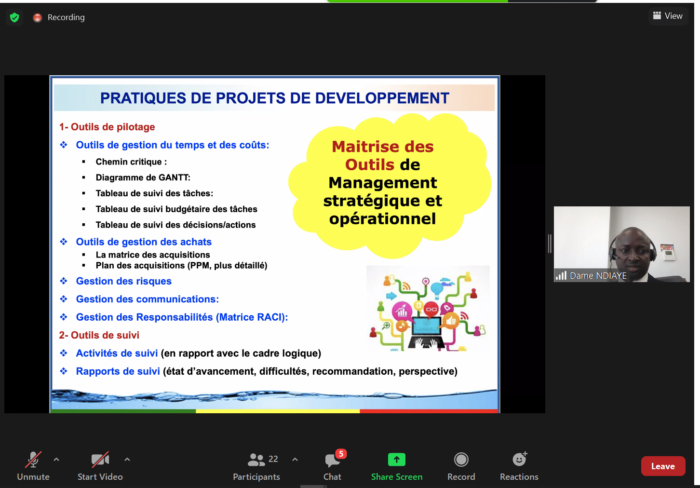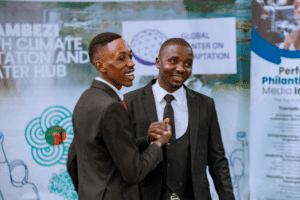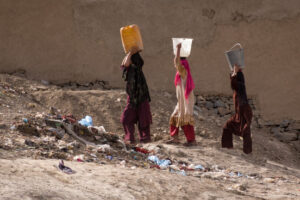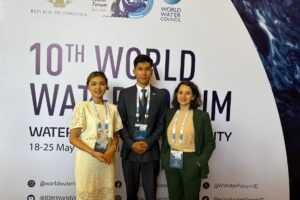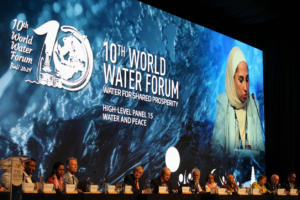Description
PARALLEL SESSIONS RECAP
Building on Day 2, the third day of the 5th General Assembly of WYPW featured thought provoking and insightful parallel sessions. Youth engagement and mobilisation were centred in discussions surrounding youth representation and their role in promoting the management of water resources and in achieving SDG 6, especially on the African continent. Participants also learnt more about tools for transboundary cooperation and the upcoming 9th World Water Forum, where the global water and sanitation community will meet in Senegal, on March 22-27, 2022 to discuss Water Security for Peace and Development.
We were excited by the passion participants expressed for staying engaged and connected in various capacities long after the assembly ends. We thank all the participants who joined in the parallel sessions of the day. It was amazing to hear from experts and representatives from different corners of the world brought together by their common goal and purpose of conserving and utilizing water for the common good for today and tomorrow.
POWER OF YOUNG WOMEN: BUILDING CONFIDENCE
Hosted by Her2O
By Janeth Morales E.
This session from Day 2 of the General Assembly sought to help young women explore what it means to be confident through listening to inspiring stories from other young women who are actively engaged as actors of change in the water sector around the world and practice building confidence through interactive breakout sessions. Briana Huber – founder of Her2O, an international non-profit that aims to stimulate women’s participation in global water management, director of water filtration at City of East Moline and a public health professional – asked participants to consider that “confidence means trust in ourselves and trust in building engagement with other people” and that “Confidence turns us to action…it is the ability to believe that we achieve our goals by our own efforts and do our best in our tasks”. Often for women, a lack of confidence leads to inaction. Ms. Huber stressed that is why it’s important to build and increase confidence in girls and young women.
Other female presenters divulged that after visualising themselves as young water professionals they were able to build their professional careers and perform within their organizations, enterprises, and NGOs. After dreaming of becoming an environmental engineer, Ratidzaishe Tracy Mupinga of Water Science Policy persevered, stating “I decided by myself, I want to be part of this and I feel that I am able to overcome these challenges, so I pushed myself, got a scholarship and went for a master…I believe that I could have a job”. Nzuhat Bachir of WYPW Pakistan strongly urged participants to find a mentor or supervisor as her mentor was helpful in starting her professional career. Testimonials from other participants also highlighted the importance of gaining knowledge and experience in building confidence.
L. Odud explains how confidence is formed, “According to the Natural Science Foundation, 95% of your thoughts are repeated daily, you decide your thoughts, your thoughts begin your beliefs, your beliefs begin your mindset, your mindset drives your actions, your actions lead to your success”. Building confidence involves identifying self-limiting beliefs, determining how they protect you, forgiving oneself, challenging these beliefs and finally reframing the narrative. After participants explored their self limiting beliefs in groups, they were asked to practice visualising themselves and their goals. Participants shared goals such as performing a new program within the organization, having a job in water diplomacy and learning a new language.
WATER AND SANITATION SERVICES FOR SUSTAINABLE DEVELOPMENT IN AFRICA
Hosted by African Ministers’ Council on Water (AMCOM)
By Syed Nasar Alam
The session titled “Water and Sanitation Services for Sustainable Development in Africa” was hosted by professionals from the African Ministers’ Council on Water (AMCOW). This panel was led by Dr. Paul Orengoh and featured contributions from Emmanuel Chimezie Uguru, Mrs. Comfort Kanshio and Ms. Margaret Kironde.
With a substantial young population, Dr Oengoh stressed that “Development cannot be achieved [in Africa] if the young population is segregated from development issues”. African youth have long been underestimated and undermined by wider society. However he emphasised that “the opportunity is great for African People and especially the youth” if African youth are included in the continent’s water sector and called upon young people “to show using this kind of platform that we are not useless and we can do what they are doing and we can do it better”.
Ms. Kironde, a policy analyst, acknowledged that water is a very limited resource and connected to all 17 SDGs. For Africa, where poverty is expected to persist in the coming decades, institutions like the African Development Bank are working to improve integrated water management in Africa but Ms. Kironde stressed that there is still room to do more and “for Africa to achieve its 2030 and 2060 agenda much effort and resources are needed”. In line with Mr. Uguru’s assertion that “youth will be key to achieve SDG 6 by 2030”, youth engagement, despite African youth facing challenges working in the water sector and even in accessing clean water, is necessary.
Like Ms. Kironde, Ms. Kanshio stated that even though we are now in the SDG era, there has been little progress in Africa. Most of the population in Africa still lacks proper sanitation facilities and open defecation is still practiced, leading Ms. Kanshino to contend that “improper sanitation is an environmental hazard” on the continent. AMCOW has conducted assessments to determine if countries are achieving their set SDG targets, provided consultation to different countries and assessed the implementation of the subsequent policies. Such monitoring efforts are an important part of the Africa Sanitation Policy Guidelines (ASPG). The organisation is also open to any collaboration that improves its capacity such as possible collaborations or exchanges among professionals working with AMCOW and the European Union.
WORKSHOP ON THE BLUE PEACE INDEX
Hosted by World Youth Parliament for Water (WYPW)
By Prabhat Joshi
Speakers Nataliya Chemayeva (WYPW), Botagoz Sharipova (WYPW), Stéphanie Piers de Raveschoot (Swiss Agency for Development and Cooperation) led the session on the Blue Peace Index (BPI), a metric to assess how countries in different river basins have managed transboundary water issues. BPI’s objective is to raise awareness about transboundary water issues, and start a general discourse about collaborative national and international water management aiming for a more peaceful, cohesive and sustainable water use, which is all the more important in the context of the climate crisis, uncontrolled water exploitation, and the population growth.
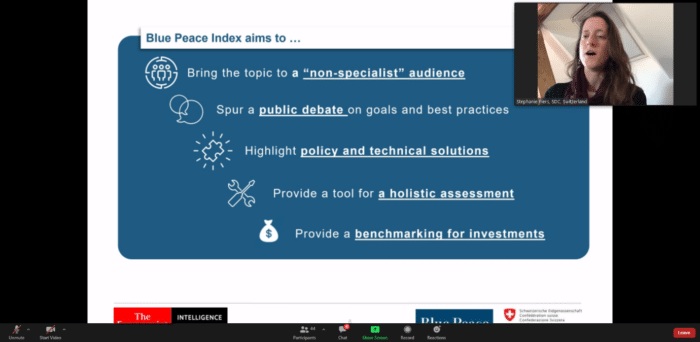
The index scores each basin and the countries that fall within them. Moreover, the assessment of shared water resources is done across five categories: Policy & legal frameworks, Institutional arrangements and participation, Water management instruments, Infrastructure & financing, and Cooperation. Until 2020, the index has measured 30 countries around seven basins: Amazon, Amu Darya, Mekong, Sava, Senegal, Syr Darya and Tigris-Euphrates. Nearly 2 out of 5 people worldwide live in transboundary river basins, and how the water is managed not just affects their lives but also their livelihood as many sectors (agriculture, industries, energy) directly depend on it. “We aim to promote this tool [BPI] as an instrument for peace”, said Stéphanie Piers de Raveschoot, “and go beyond the traditional experts (the grey-hairs) to a wider audience for a lasting impact”.
In the end, the audience asked questions about the general acceptability of the BPI, and how it could be used by public and private enterprises. To this, the speakers emphasised that the index can be used to identify key gaps in the transboundary water management or identify the most impactful actors and stakeholders, which could be pivotal in decFiding how the water is managed. Speakers Nataliya Chemayeva and Botagoz Sharipova also introduced the Blue Peace Youth Calculations and provided links to several key resources and guidelines to encourage youth groups across the world to participate in assessing transboundary waters.
More details available here: https://bluepeaceindex.eiu.com/#/
MOBILIZING YOUTH VOICES FOR THE 9TH WORLD WATER FORUM
Hosted by 9th World Water Forum and the Youth Steering Committee
By Ransford O.Tetteh
The main objective of this session was to highlight the potential of youth voices towards the upcoming 9th World Water Forum to be held in Dakar, Senegal, through active participation. In view of the above, stakeholders were encouraged to speak to the topic. The major challenge facing youth mobilization and the water sector as a whole is financing given that a sizable population is still without access to safe water and sanitation. Informed by her past experience Karishma Asoodani, a youth delegate asserted that this lack of financing breeds apathy towards mobilization to create and sustain awareness of water issues. Nonetheless, the voice of the youth is needed. Participants were challenged to think about ways in which they could become engaged in conversations and initiatives surrounding water security and development.
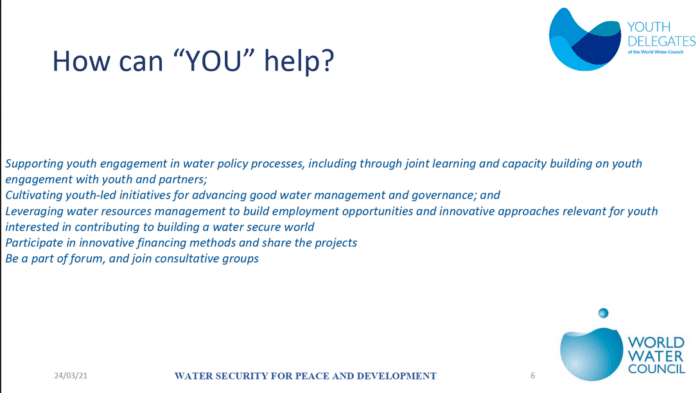
Issues from past forums will be front and center during the 9th World Water Forum.
- We are not on track to achieve the SDG’s with the current policies and financial efforts, specifically for water resources
- Management issues, especially for water supply and sanitation services
- Inadequate prioritization of water issues in national development plans
- Huge investment gaps.
According to Mr. Mamadou Guisse, a coordinator for the upcoming forum, the forum provides a unique opportunity for youth to address these persistent issues by creating the space for youth to be a driving force in innovation, showcase their projects and pitch their business ideas for support.
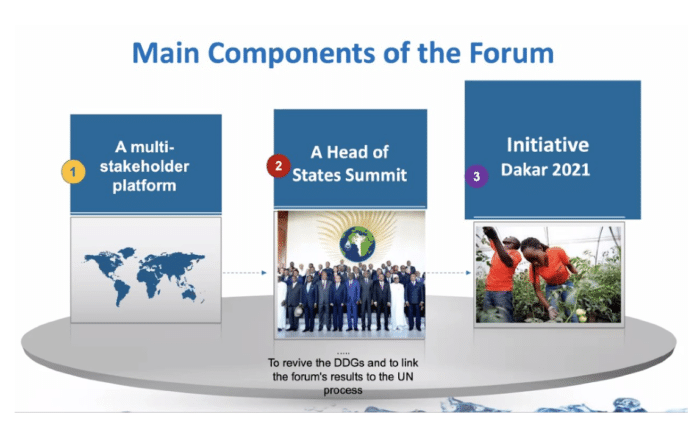
HOW TO GET INVOLVED IN WYPW
Hosted by World Youth Parliament for Water (WYPW)
By Syed Nasar Alam
TBD
WORKING GROUP ACTIVITIES RECAP
WORKING GROUP 3: WATER SECURITY FOR PEACE AND DEVELOPMENT
By Daouda Ouedraogo
The third working group, a french speaking group, is tasked with developing a response for a Senegalese local water issue throughout the duration of WYPW’s 5th assembly. On March 25th the group held a capacity building session on the best practices for development projects and working with local communities. The workshop was facilitated by Dame Ndiaye, a water and sanitation engineer and development project management specialist. The facilitator introduced development project management, recalling the fundamental aspects of the life of a project. In response to questions about the inclusion of sociological analysis in the success of development projects, Dame Ndiaye replied, “As a development actor, we must succeed in explaining the stakes of the development project to the beneficiary populations and encourage their involvement for the success of the project.” To illustrate his point, Dame Ndiaye shared several examples of local development projects in which he took part and which are now models of success in Senegal, including the project to manage sludge and potential risks to water sources and people’s health and the contribution to reducing water losses in private estates in Dakar.
